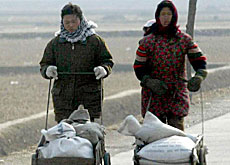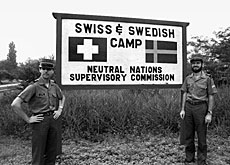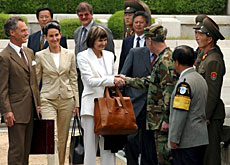Swiss visit reveals reality of life in North Korea

The Swiss foreign minister, Micheline Calmy-Rey, has been visiting Swiss humanitarian aid projects during a five-day trip to North Korea.
Her tour of the communist country included stops in villages outside the capital, Pyongyang, to see how and where Swiss aid is targeted.
The Swiss Agency for Development and Cooperation (SDC) began humanitarian operations inside North Korea in 1995, when it responded to a severe drought and famine by providing emergency food aid.
A permanent office – staffed by an SDC coordinator together with a small team of international agriculture experts – was established two years later in Pyongyang.
The Swiss charity, Caritas, is also actively supporting North Korean farmers to make a living.
The Hong Kong-based director of its Asian operations, Kathi Zellweger, has visited the country more than 40 times since the launch of humanitarian activities in the mid-1990s.
“We are now involved in agriculture, forestry and fisheries, which is a shift from purely humanitarian aid to development cooperation,” Zellweger told swissinfo.
“North Koreans are very eager to help themselves, and we of course are happy about this because our principle is to help people to help themselves.”
Small-scale projects
During her visit to Pyongyang – the first by a Swiss cabinet minister since diplomatic ties were established in 1974 – Calmy-Rey has been touring a number of similar small-scale agricultural projects funded by the SDC.
“She visited a variety of projects, none of which cost a huge amount of money to implement, but which are useful and enormously appreciated,” said foreign ministry spokeswoman, Muriel Berset Kohen.
Aid agencies estimate that as many as two million North Koreans have died since the middle of the last decade as a result of acute food shortages caused by a series of natural disasters.
The SDC invests a total of SFr4 to SFr5 million each year in the country, much of which is designed to help farmers in rural areas become more self-sufficient.
“This year, for example, North Korea has asked us to receive 15 heads of cooperatives, who are coming to Switzerland to learn with Swiss farmers how to work in a market economy,” says Werner Wirz, SDC desk officer for North Korea.
Long-term programme
But Zellweger warns that it will take years – if not decades – before ordinary North Koreans are able to survive without food supplies.
“For the average North Korean, life is a struggle for daily survival – trying to get enough food, trying to get by.
“Springtime is critical, when food stocks are depleted, and when nothing is growing in their own fields.”
The Caritas director explains that millions of people suffer from chronic malnutrition, with children below the age of six worst affected by prolonged food shortages.
Zellweger adds that city dwellers are no better off than those living in more isolated parts of the country.
“People in cities and towns have more difficulties because they have no access to land, they live in an apartment block, and you even see them planting [food] on their balconies.”
Countering criticism
International aid organisations and charities are regularly forced to counter criticism that food aid to North Korea is counter-productive and does little to encourage the communist regime in Pyongyang – headed by its reclusive leader, Kim Jong-il – to open up to the outside world.
But Wirz says Swiss aid is specifically targeted and monitored to ensure that it goes directly to those most in need of it.
“North Korea considers assistance from Switzerland to be neutral and not politically biased. We do not interfere in their internal affairs,” Wirz told swissinfo.
“Our target group is the population, and not the government. Of course we coordinate with the government, but since we are present [in Pyongyang] with our own staff, we are very much in command and can see what happens to our aid.
“This provides a guarantee that, for instance, the [North Korean] army does not profit from our assistance.”
Looking ahead
Zellweger agrees that the immediate needs of North Koreans must come before politics.
“From our perspective, humanitarian aid and politics have to be separated. We are trying to help ordinary people who do not have enough to eat,” says Zellweger.
But the development aid specialist concedes that the future direction of humanitarian assistance is inextricably linked to the political shape of North Korea.
She expresses concern that the Bush administration’s policy towards North Korea has not encouraged Pyongyang to “move forward” in the process of political reform.
“Tensions are high, and after Iraq, ordinary North Koreans really feel they are going to be next.”
swissinfo, Ramsey Zarifeh
The Swiss foreign minister, Micheline Calmy-Rey, has been touring Swiss humanitarian aid projects during a five-day visit to North Korea.
The Swiss Agency for Development and Cooperation (SDC) has been active in North Korea since it started delivering emergency food aid in 1995.
Humanitarian work now focuses on helping farmers in rural areas to become more self-sufficient.
The Swiss charity, Caritas, has also been active in North Korea since the mid-1990s, in the fields of agriculture, forestry and fisheries.

In compliance with the JTI standards
More: SWI swissinfo.ch certified by the Journalism Trust Initiative


You can find an overview of ongoing debates with our journalists here. Please join us!
If you want to start a conversation about a topic raised in this article or want to report factual errors, email us at english@swissinfo.ch.